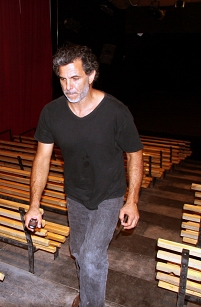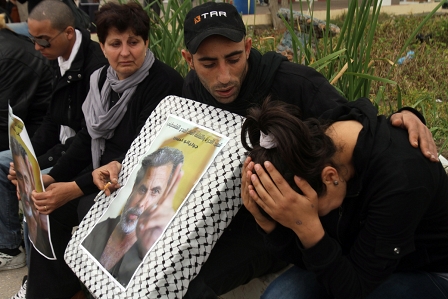Erstellt am: 8. 4. 2011 - 12:48 Uhr
The Death of A Bridge Builder
Juliano Mer Khamis, the Arab Israeli actor, director and political activist had a dream. His dream was that art could overcome hatred. He formed and led the Freedom Theatre in Jenin refugee camp in the Palestinian territories. It’s an amateur group involving the local youth. His work is said to have helped local young people cope with the trauma of occupation and the bloody Intifada uprisings by engaging them with creativity and critical thinking.

EPA STR
It was that peaceful dream, it appears, that cost Khamis his life this week. On Monday, while driving his car in Jenin, he was shot dead by masked gunmen. His infant son was in the back seat. The wife he leaves behind is pregnant with twins.
Khamis was the son of a Jewish mother and an Arab father. Those who knew him described him as a natural bridge-builder. He described himself as a 100% Jewish and 100% Palestinian. A former soldier in the Israeli army, he had become an outspoken critic of Israel’s policies in the Palestinian territories and one of the few people to live in a refugee camp by choice. “He made his commitment to a different set of values,” our Middle-East correspondent Irris Makler told me, “He wanted to give something back to Palestinian youth.”
He also had a commitment to free thinking. “He said freedom begins on the inside,” says Makler, “He wanted to restore some of the happiness and contentment and independent thought to the kids.” That involved staging George Orwell’s Animal Farm, saying, as he launched the project, that there wasn’t enough critical thinking inside Palestinian society and that it was the duty of the Freedom Theatre to push to change that culture.
His work, it seems, angered the more conservative parts of Palestinian society. In the plays he staged, girls and boys acted alongside each other. He taught the young people to work with both still and video cameras. Certain schools of thought among the Palestinian militants objected to this, says Makler, and that is thought to have led to his murder.
He might have made deadly enemies within the violent minority, but the tributes to Khamis, flowing in from both Palestinians and Israelis, show that his life mission of cultivating common respect and cooperation was appreciated by the larger majority in both Israeli and Palestinian society. As Makler say “Even people who didn’t know him, who knew only of him, speak as if they have lost a friend.” She says they have also lost a symbol. He represented the struggle for a bi-national state and the struggle to overcome the terrible effects of the violence perpetrated by both sides. “In his death, a huge amount of people feel bereft.”

EPA Alaa Badarneh
The fact that his life was beautiful makes his death harder to accept, but will it ensure a lasting legacy? His partner at the Freedom Theatre has vowed to keep his dream alive and continue his work, but she too has been receiving death threats. In the Middle East, soldiers and militants do much of the talking about commitment and courage, but it takes real guts to walk to path of peace.


